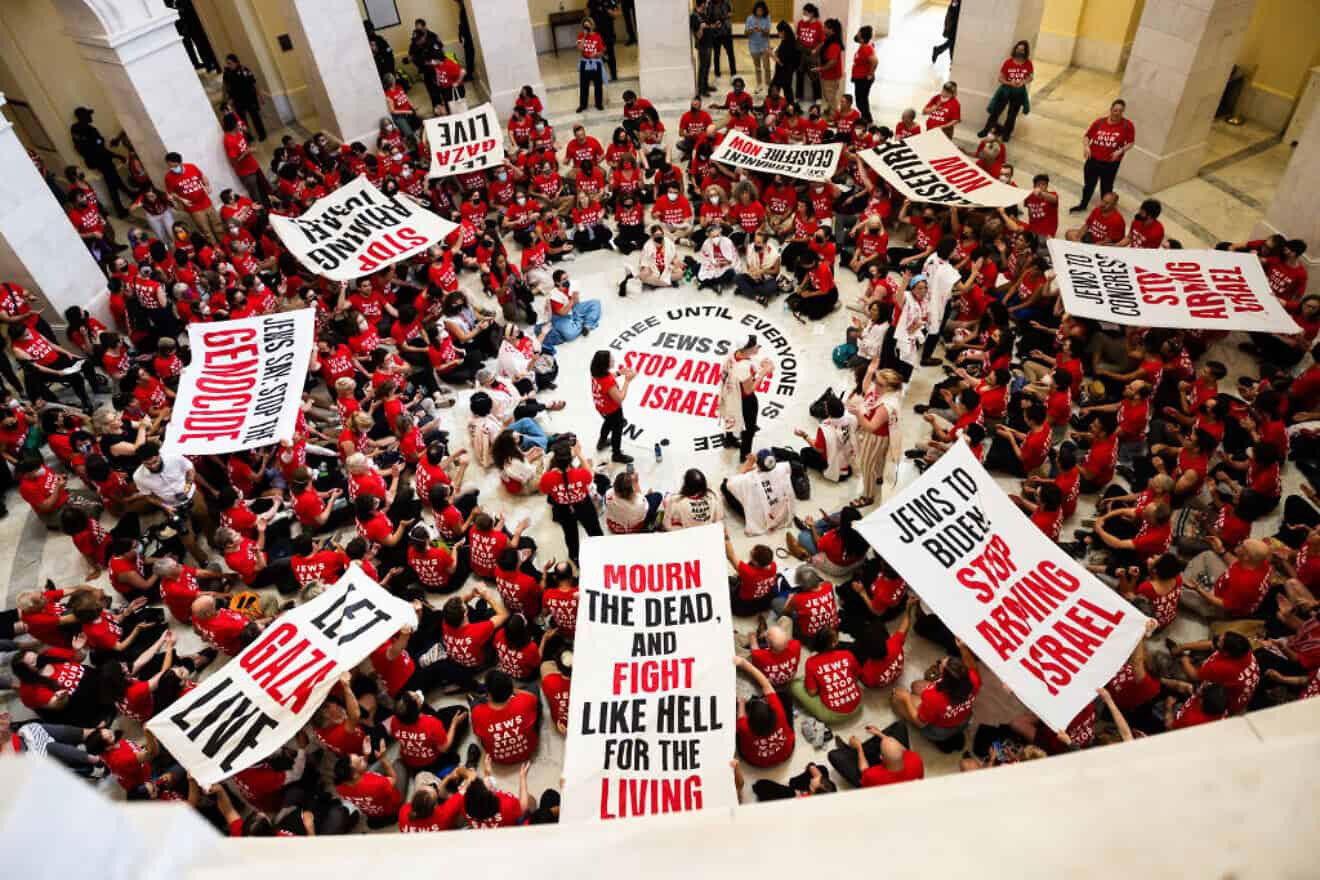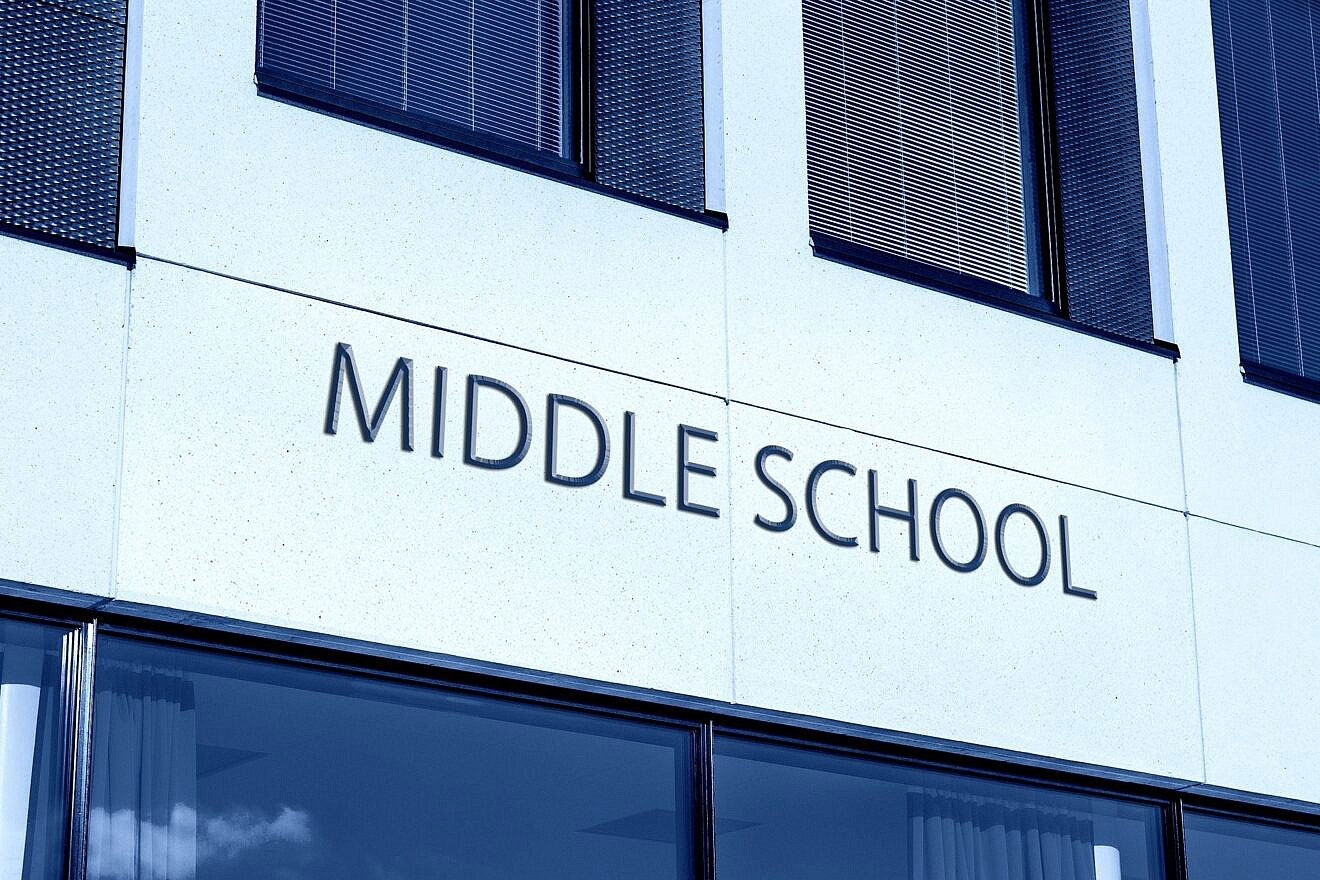Courtesy of JNS. Photo credit: Tierney L. Cross/Getty Images
Anti-Israel demonstrators from Jewish Voice for Peace protest at the Canon House Building in Washington, D.C., on July 23, 2024
(JNS) — The majority of Jews in the United States disagree with the views of the anti-Israel activist group Jewish Voice for Peace (JVP), according to a poll commissioned by the Jewish Majority, which conducts research and provides communal leaders with resources, information and training to educate the public about Jewish priorities.
Jewish Voice for Peace, which describes itself as the largest progressive Jewish anti-Zionist organization, played a pivotal role in organizing pro-Palestinian protests that erupted on U.S. college campuses in the wake of the Hamas-led terrorist attacks in southern Israel on Oct. 7, 2023.
Protests in the fall of 2023 became tent encampments in the spring of 2024 that quickly turned from pro-Palestinian to pro-Hamas, with a number of them becoming violent. At some universities, they also had the support of faculty and administrators.
According to the poll, 70% of American Jews consider anti-Zionist movements inherently antisemitic, and 76% believe the 2024 anti-Israel campus protests were antisemitic.
Jonathan Schulman, executive director of Jewish Majority, told JNS that JVP has been falsely presenting itself as a representative of Jewish Americans.
“For a long time, we have seen a well-organized and well-financed movement of individuals speaking up in the media about their anti-Zionism from their position as a Jew, and what we have found is that these positions are fringe and that they don’t represent the majority of American Jews,” he said.
According to the poll, 91% of respondents are concerned that social media amplifies the opinions of fringe movements, making them seem more widespread than they actually are.
JVP has created the appearance of representing the Jewish community by successfully harnessing social media, according to Schulman.
“This is a bit of a wake-up call for the Jewish community because when you are part of a community where there is 80, 85, 90% agreement about supporting Zionism, you don’t feel the need to speak up as much,” he said. “However, when you are part of a very marginal 5% to 10% of the community, like an organization like Jewish Voice for Peace, you think it is your job to constantly speak up and make it appear that your views are more common than they are.”
“My hope is that the American Jewish community will use this data to actually push back and speak up and say, ‘As a Jew, I support the things that most Jews support,”’ he added. “It seems the only time we ever hear somebody say ‘as a Jew,’ they are refuting the views of the majority of the American Jewish community.”
‘Identify culturally or ethnically’
The poll reported that 85% of American Jews believe that Hamas wants to commit genocide against Jews and Israel.
According to a statement written on Oct. 7, 2023, as Hamas terrorists were attacking southern Israel, JVP wrote that “inevitably, oppressed people everywhere will seek — and gain — their freedom. We all deserve liberation, safety and equality. The only way to get there is by uprooting the sources of the violence, beginning with our own government’s complicity.”
The left-wing group has conducted protests in which they block traffic, demonstrate in front of the homes of government officials, and often don masks to hide their identity. According to the poll, 75% of American Jews believe blocking traffic is unacceptable, 60% disprove protesting outside the homes of government officials, and 55% believe protesters should not conceal their identity with masks.
The survey also revealed that a majority of Jewish Americans are either members of or generally support the policies of Jewish organizations such as the Anti-Defamation League, Jewish National Fund, American Jewish Committee and the Jewish Federations of North America.
The poll was conducted from Dec. 16-24, 2024, with 800 Jewish adults by Public Opinion Strategies, a research firm based in Virginia.
William McInturff, co-founder of Public Opinion Strategies, told JNS that the survey included two definitions of Jewish identity.
“First, respondents were asked a religious identification question: ‘What is your religion?’ and in response, 88% of participants selected ‘Jewish’ from the list of options,” he said. “Second, recognizing that some individuals — particularly, among Jewish and Catholic populations — may not actively practice their religion but still identify culturally or ethnically, the survey included an additional criterion.”
“As a result, 12% of participants, while not religiously Jewish, identified as Jewish based on their heritage and cultural background,” he said. “This approach reflects common demographic research practices, where both religious affiliation and cultural identity are considered in defining Jewish identity.”





